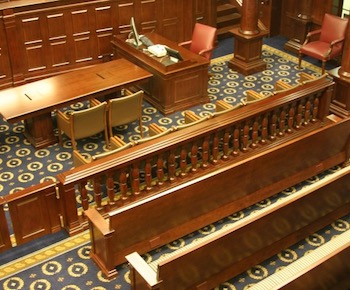“Judge Newman argued that it was contrary to the America Invents Act, the mandate rule of the Administrative Procedure Act, and the USPTO’s own Office SAS Guidance for the PTAB to disregard the Federal Circuit’s remand order.”
 The Federal Circuit recently denied a petition by BioDelivery Sciences International, Inc. (BioDelivery) for a rehearing en banc following a refusal by the Patent Trial and Appeal Board (PTAB) to apply the Supreme Court’s decision in SAS Institute Inc. v. Iancu, 138 S. Ct. 1348 (2018). See BioDelivery Scis. Int’l, Inc. v. Aquestive Therapeutics, Inc., Nos. 2019-1643, 2019-1644, 2019-1645, 2020 U.S. App. LEXIS 1030 (Fed. Cir. Jan. 13, 2020) (Before Prost, Chief Judge, Newman, Lourie, Dyk, Moore, O’Malley, Reyna, Wallach, Taranto, Chen, and Hughes, Circuit Judges) (Opinion for the Court, Lourie, Circuit Judge) (Dissenting opinion, Newman, Circuit Judge).
The Federal Circuit recently denied a petition by BioDelivery Sciences International, Inc. (BioDelivery) for a rehearing en banc following a refusal by the Patent Trial and Appeal Board (PTAB) to apply the Supreme Court’s decision in SAS Institute Inc. v. Iancu, 138 S. Ct. 1348 (2018). See BioDelivery Scis. Int’l, Inc. v. Aquestive Therapeutics, Inc., Nos. 2019-1643, 2019-1644, 2019-1645, 2020 U.S. App. LEXIS 1030 (Fed. Cir. Jan. 13, 2020) (Before Prost, Chief Judge, Newman, Lourie, Dyk, Moore, O’Malley, Reyna, Wallach, Taranto, Chen, and Hughes, Circuit Judges) (Opinion for the Court, Lourie, Circuit Judge) (Dissenting opinion, Newman, Circuit Judge).
The petition for rehearing arrived at the Federal Circuit following a decision by the PTAB to disregard a remand order by the Federal Circuit ordering the PTAB to apply the Supreme Court’s holding in SAS Institute and decide all of the claims and grounds challenged in an inter partes review. Rather, the PTAB, on remand, withdrew all of its past actions as to the proceedings at issue and denied the petition in its entirety. BioDelivery then petitioned the Federal Circuit for a rehearing en banc, but the Federal Circuit voted to deny the rehearing, with Circuit Judge Newman offering the only dissenting opinion.
In her dissent, Circuit Judge Newman discussed the significance of the Federal Circuit’s decision to deny the rehearing and argued that the denial showed not only that the PTAB is not required to comply with the Court’s remand order but also that the PTAB’s noncompliance is not reviewable. Circuit Judge Newman argued that it was contrary to the America Invents Act, the mandate rule of the Administrative Procedure Act, and the USPTO’s own Office SAS Guidance for the PTAB to disregard the Federal Circuit’s remand order. See 35 U.S.C. § 144; 28 U.S.C. § 2196; 5 U.S.C. §§706(2)(A), (C)); Guidance on the Impact of SAS on AIA Trial Proceedings, U.S. Patent & Trademark Office (Apr. 26, 2018), https://www.uspto.gov/patents-application-process/patent-trial-and-appeal-baord/trials/guidance-impact-sas-aia-trial.
Reiterating that the PTAB’s refusal to comply the Federal Circuit’s remand order should have been reviewed, Circuit Judge Newman argued that “the legislative record contains no contemplation of a PTAB procedure whereby, after full PTAB trial and decision and appeal to the Federal Circuit, the PTAB could annul the appeal and remove the entire action and decisions and procedure from history, insulated from review.” However, despite Circuit Judge Newman’s concerns with the PTAB’s actions, the majority voted to deny the rehearing.
The Court’s refusal to rehear the case effectively means that, although the PTAB is generally compelled to follow a remand order from the Federal Circuit, the PTAB may be able to disregard a remand order by denying institution of the trial on remand, and its decision may be unreviewable.

![[IPWatchdog Logo]](https://ipwatchdog.com/wp-content/themes/IPWatchdog%20-%202023/assets/images/temp/logo-small@2x.png)


![[Advertisement]](https://ipwatchdog.com/wp-content/uploads/2024/04/UnitedLex-May-2-2024-sidebar-700x500-1.jpg)
![[Advertisement]](https://ipwatchdog.com/wp-content/uploads/2024/04/Artificial-Intelligence-2024-REPLAY-sidebar-700x500-corrected.jpg)
![[Advertisement]](https://ipwatchdog.com/wp-content/uploads/2024/04/Patent-Litigation-Masters-2024-sidebar-700x500-1.jpg)

![[Advertisement]](https://ipwatchdog.com/wp-content/uploads/2021/12/WEBINAR-336-x-280-px.png)
![[Advertisement]](https://ipwatchdog.com/wp-content/uploads/2021/12/2021-Patent-Practice-on-Demand-recorded-Feb-2021-336-x-280.jpg)
![[Advertisement]](https://ipwatchdog.com/wp-content/uploads/2021/12/Ad-4-The-Invent-Patent-System™.png)






Join the Discussion
11 comments so far.
Pro Say
February 1, 2020 05:33 pmSure, you’re welcome Anon. “Sounds better” was the best I could muster on a lazy Saturday. 🙂
Will dive deeper legally next time around.
Anon
February 1, 2020 11:31 amThanks Pro Say — please realize that “sounds better” is not necessarily a great tool for legal discussions.
Pro Say
February 1, 2020 11:16 amAnon @7: Nothing specific, really; just felt that she had the better overall argument.
TFCFM
January 31, 2020 09:54 amVG@#4: “The SAS decision states that if the PTO Director initiates on at least ONE CLAIM in the petitioner’s IPR request….it has to consider EVERY CLAIM (it can’t just pick and choose which to look at…)
That is one holding of SAS, and under that holding, the PTAB’s “partial” institution was improper and rightly reversed.
However, another holding of SAS was this:
Here the statute says the Director must decide “whether to institute an inter partes review . . . pursuant to a petition.” §314(b). The Director, we see, is given only the choice “whether” to institute an inter partes review. That language indicates a binary choice—either institute review or don’t. And by using the term “pursuant to,” Congress told the Director what he must say yes or no to: an inter partes review that proceeds “[i]n accordance with” or “in conformance to” the petition. Slip Op. at 6-7. http://www.supremecourt.gov/opinions/17pdf/16-969_f2qg.pdf
The PTAB’s (i.e., Director’s, given that the Director has delegated this authority to the PTAB) improper “partial” institution being improper, it was properly reversed and remanded. Upon remand, the PTAB — properly and completely in keeping with the recognition in SAS that the institution decision must be “yes” or “no” on ALL grounds raised in a petition, chose “no.”
Neither SAS nor the statute itself requires more.
Anon
January 30, 2020 08:48 pmPro Say,
In what possible way do you think that Dame Newman got this one right? Are you only thinking of some specific Ends, or do you understand the legal Means at play here?
Anon
January 30, 2020 07:02 pmValuationGuy,
Your understanding of the effect of the interceding case is not correct.
What WAS remanded was the institution decision and NOT “the institution decision predetermined to have a specific outcome.” The CAFC cannot obtain in a remand what it lacks authority to obtain in any other manner.
Your view of “legally correct” is just not obtained.
Pro Say
January 30, 2020 05:40 pm“But the Emperor has no clothes!”
Judge Newman
Sorry “10 of 11” (not to be confused with “7 of 9”), but Judge Newman yet again got this one right.
Yet one more example piled on top of so many others why the unconstitutional PTAB should be abolished.
Valuationguy
January 30, 2020 04:38 pmNewman’s argument is that the PTAB played cute to get around the CAFC’s clear remand order to reconsider ALL THE OTHER CLAIMS IN THE PETITIONER’s IPR filing which were not instituted…something that both the patent owner and IPR petitioner were ENTITLED to once the IPR was initiated. The SAS decision states that if the PTO Director initiates on at least ONE CLAIM in the petitioner’s IPR request….it has to consider EVERY CLAIM (it can’t just pick and choose which to look at…)
Based on what ACTUALLY happened (true history), it was obvious that AT THE TIME the PTO/PTAB felt that at least ONE CLAIM of the initial IPR was worthy of initiating an IPR on…..since the PTAB in fact did grant the IPR on that claim initially….and while the petitioner and PTAB ultimately failed to prove it invalid (after years of re-examining it and fighting over appeals)…the true of the matter is that the the PTAB was required by the intervening SAS decision (which correctly read the AIA statute) to consider ALL the (other!) claims too.
So…the actual situation is this…the only claim that reached the (pre-SAS) PTAB threshold of making a prima facie case for invalidity was IN FACT already proven to be found NOT INVALID (by the PTAB and confirmed by the CAFC)…but the petitioner and patent owner is REQUIRED by the SAS decision to get an answer on all the OTHER CLAIMS in the IPR petition.
Rather than separately issue a decision on all the other claims (which would have ultimately reach a decision that they too were “not invalid” but would have wasted a lot of time and resources)…the PTAB decided to essentially nullify the already “found not invalid” claim decision by DELIBERATELY misinterpreting the CAFC order and recasting their INITIAL IPR decision as one that ALL the claims in the ENTIRE PETITION failed to make a prima facie case of invalidity even though this result is a blatant LIE due to using judicial HINDSIGHT. Since the PTAB is now claiming (post remand) the entire initial IPR decision was unworthy of initiation…and SCOTUS precedence prevents CAFC review of ANY PTAB IPR initiating decision…. the CAFC is stuck from judicially reversing the BS that the PTAB did in revising and ignoring the history of the case.
Judge Newman is not the kind of person to allow this kinda of crap to spread because it potentially opens doors which smarmy lawyers can try to pry open into loopholes to deny either patent owners or IPR petitioners justice in the future. The rest of the CAFC just shrugged their shoulders…and indicated no real harm done so they aren’t going to force the PTAB to jump through the legally correct hoop…just to reach a preordained outcome.
VG
Anon
January 30, 2020 12:43 pmYou may well be correct TFCFM (and its not only the title that is off, but the discussion within as well).
The thing that gets me though is that the blogosphere for both the original decision and the ‘more recent’ denial of en banc review had plenty of discussion highlighting why Newman was wrong and this piece appears to not have been awake through any of it.
TFCFM
January 30, 2020 10:41 am“I have to wonder at this article, as this is old news…”
I presume that the reason that it’s reappeared is simply that the denial of en banc review is relatively “new.” I think one has to wonder at the tenor of the article, though. Clearly, the authors disagree with the outcome — which is, I suppose, is why the title of the article was not something more accurate, like:
“10 Out of 11 Fed Circuit Judges Agree: PTAB Can Decline to Institute IPRs.“
Anon
January 30, 2020 09:18 amI have to wonder at this article, as this is old news, and as has been explained across several blogs, Judge Newman was simply wrong as to what the holding of SAS portends.
In a nutshell, the remand can NOT dictate what only the PTAB may decide (the institution decision) and the prior decision by the PTAB was every bit a decision to NOT institute on those claims not instituted as it was a decision to institute on those claims instituted.
The CAFC has zero authority to force the actual all or nothing to be either the “all” or the “nothing,” as EACH has the same impact of taking away the item that was actually remanded: the institution decision.